The Body Shop initiative that’s changing the lives of waste pickers in Bangalore
Waste pickers are some of the most deprived communities in India, but a new initiative by The Body Shop is offering them a lifeline. Andrea Thompson went to meet women in Bangalore whose lives are being transformed
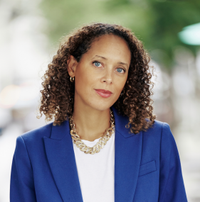
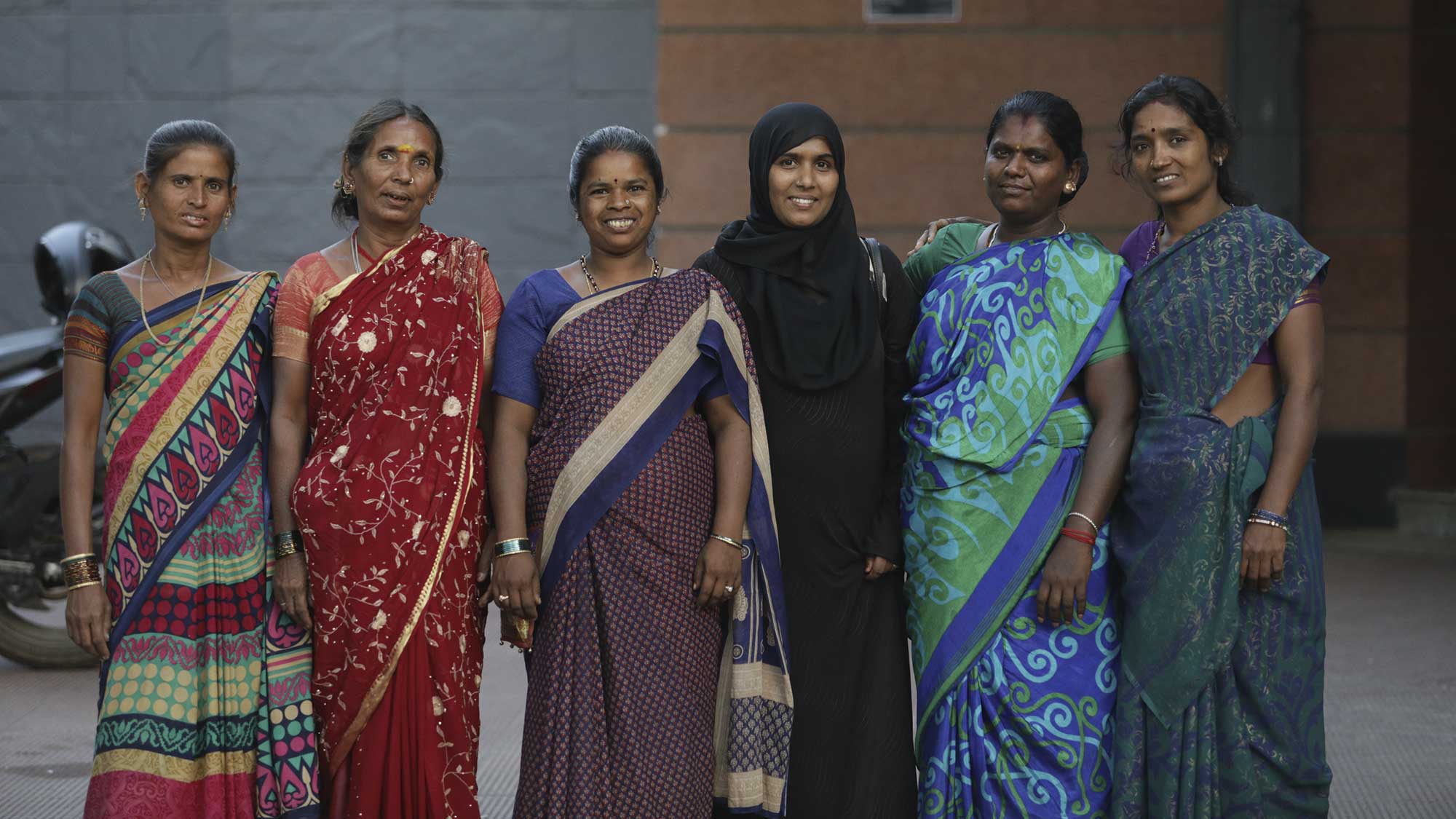
Celebrity news, beauty, fashion advice, and fascinating features, delivered straight to your inbox!
You are now subscribed
Your newsletter sign-up was successful
Waste pickers are some of the most deprived communities in India, but a new initiative by The Body Shop is offering them a lifeline. Andrea Thompson went to meet women in Bangalore whose lives are being transformed
It is through clouds of dust, on a dirty rubbish dump that I first see Dolly – her immaculate, brightly coloured sari strangely at odds with her surroundings. The 22-year-old stands under a flapping white plastic awning attempting to shade herself from the intense 35˚c heat, a six-month-old baby girl on her hip. Her aunt and sister-in-law crouch on the ground nearby, busily separating filthy plastic waste from paper, and broken glass with their bare hands, while a small child pads nonchalantly between them, barefoot.
We are in the heart of the fastest growing Indian city of Bangalore. It is unbearably hot, and the air is thick with a grey dust that sticks in the throat. But for Dolly, this is home. As a waste picker, her days are spent with 11 members of her husband’s family, who all live here too, separating waste dumped here from across the city for recycling. ‘I’ve been picking waste since I left school five years ago,’ says Dolly, who moved to India’s busy tech hub of Bangalore last year from her family home in Delhi after getting married. ‘It is hard, sometimes dangerous work. We step on broken glass or get bitten by stray dogs. We get lots of back problems from bending down. But my dream is to make some money so I can have a farm of my own in the countryside. I don’t want my daughter to do this work.’
There are 1.5 million waste pickers like Dolly in India who rely on sorting rubbish and selling on anything recyclable or of monetary value for their livelihoods. As one of the lowliest jobs in society, waste picking is almost exclusively a female role, with the majority of pickers malnourished and living below the poverty line. More than 95 per cent are also Dalits, or the untouchables – the lowest caste in the Hindu system, considered unclean and shunned by Indian society. It’s a precarious job with limited access to education and healthcare, plus a corrupt supply chain. It’s also largely unregulated and subject to volatile pricing. Within the past three years alone, pickers have seen the value of plastic suddenly drop by as much as 60 per cent overnight, leaving many on the point of starvation.
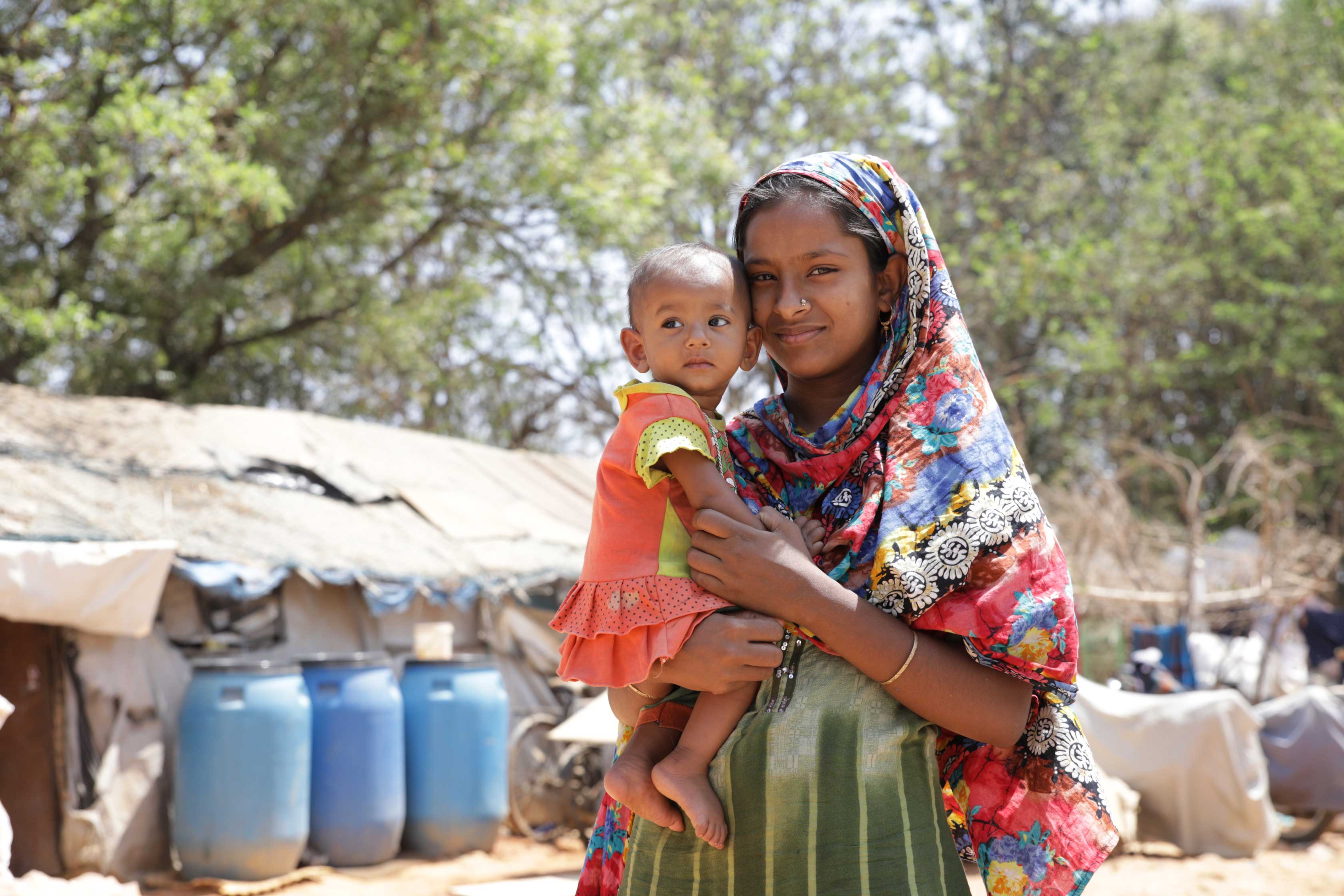
Yet these pickers play a critical role, not just in helping to keep the country’s biggest cities clean, but on a global level by preventing plastic waste from entering our oceans and rivers. That’s no small feat when you consider 80 per cent of the ocean's plastic comes from five rivers in Asia. In Bangalore alone, pickers collect 1,050 tonnes of recyclable plastic every day.
However, Dolly and her family are, despite first impressions, some of the fortunate ones. They are part of a new initiative launching in May that is set to benefit 2,500 other waste pickers across the city of Bangalore.
The Body Shop, renowned for its ethical trading initiatives, has teamed up with tech business Plastics For Change and Hasiru Dala, a local NGO and social enterprise, to buy 250 tonnes of plastic collected by pickers this year, which will rise to 500 tonnes in 2020. Following a thorough cleaning process, the recycled plastic will be used to package haircare ranges – including its popular Ginger Shampoo, one bottle of which is sold every four seconds – in The Body Shop stores around the world.
Celebrity news, beauty, fashion advice, and fascinating features, delivered straight to your inbox!
‘We are in the midst of a global plastic crisis,’ says Kate Levine, the brand’s global director of communications and activism. ‘But plastic can be a force for good. It’s a commodity they have a lot of in these communities. By buying it like we would do shea butter in Africa, we can set fair conditions and prices, and give access to global markets. The aim is to formalise the process of waste picking and empower these women to be entrepreneurs in their own rights.’
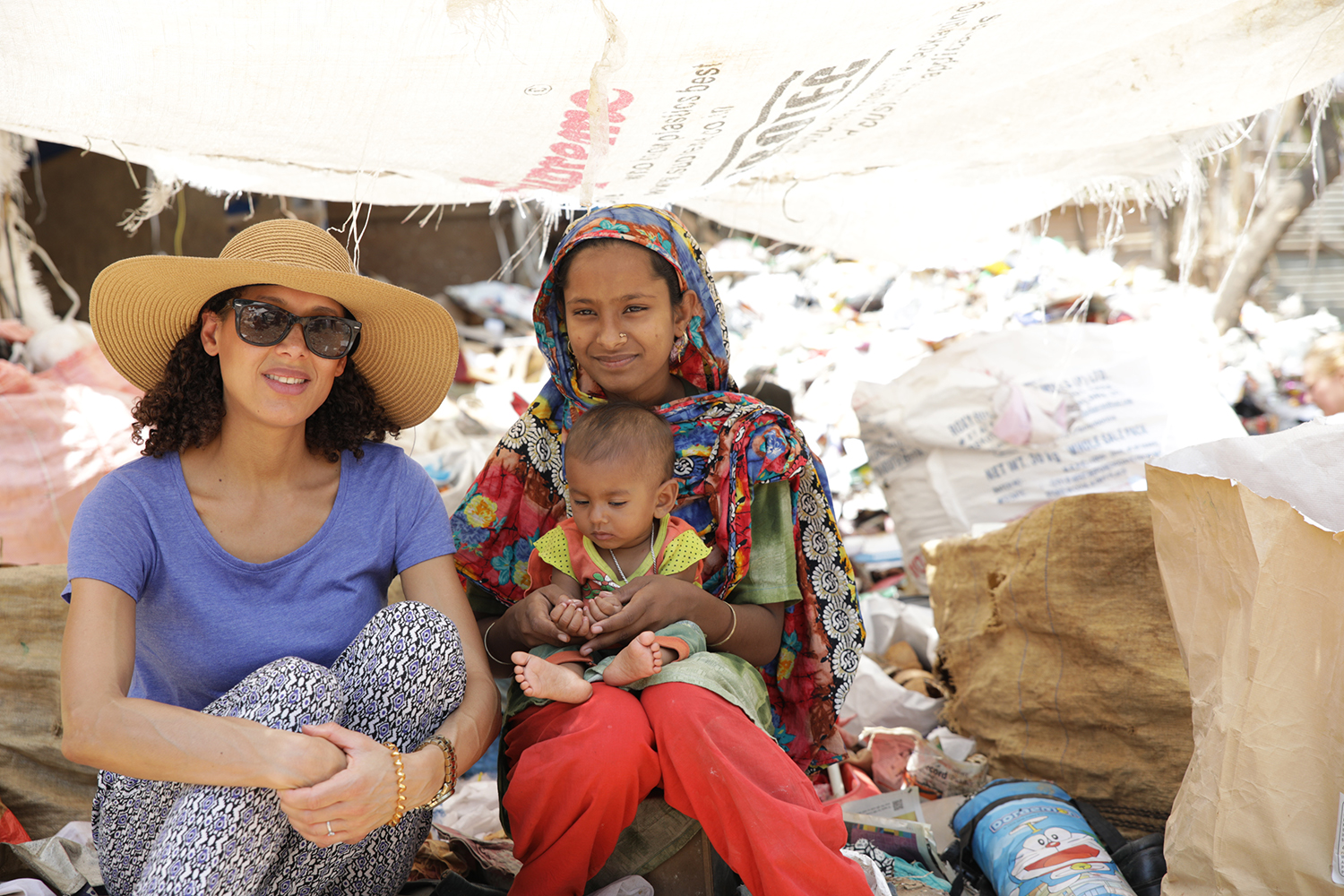
‘I’m proud to say I’m an entrepreneur instead of being ashamed of what I do’
With the support of Plastics For Change, Hasiru Daala and The Body Shop, Dolly’s family is able to rent the land on which they sort the waste, safe in the knowledge that there is a steady market for recycled plastic, and business opportunities for the future. This gives the family an element of control over their lives. Not to mention a sense of pride in what they do.
‘Here is all the plastic we have sorted and reserved for The Body Shop,’ says Sonia, Dolly’s 14-year-old sister-in-law, as she guides me towards a ring-fenced area full of plastic bottles at the edge of the compound. ‘With this programme we can look to the future, make plans, save some money and provide for the next generation,’ adds her aunt Rekha, 38, gesturing to the youngest member of the family – Saulman, a three-month-old baby who sits peacefully in the arms of his mother Sonya, 28.
The scheme is a fitting addition to The Body Shop’s Community Trade programme, launched by founder Anita Roddick in 1987, under the slogan ‘Trade Not Aid’. Today, the initiative benefits 17,000 people in marginalised communities across the world. Key to the scheme is the introduction of ID cards for all pickers, says Nalini Shekar, co-founder of the partner NGO Hasiru Dala, a trade union for waste pickers started in 2010 to offer social protection for workers and their families. It currently has 8,000 members.
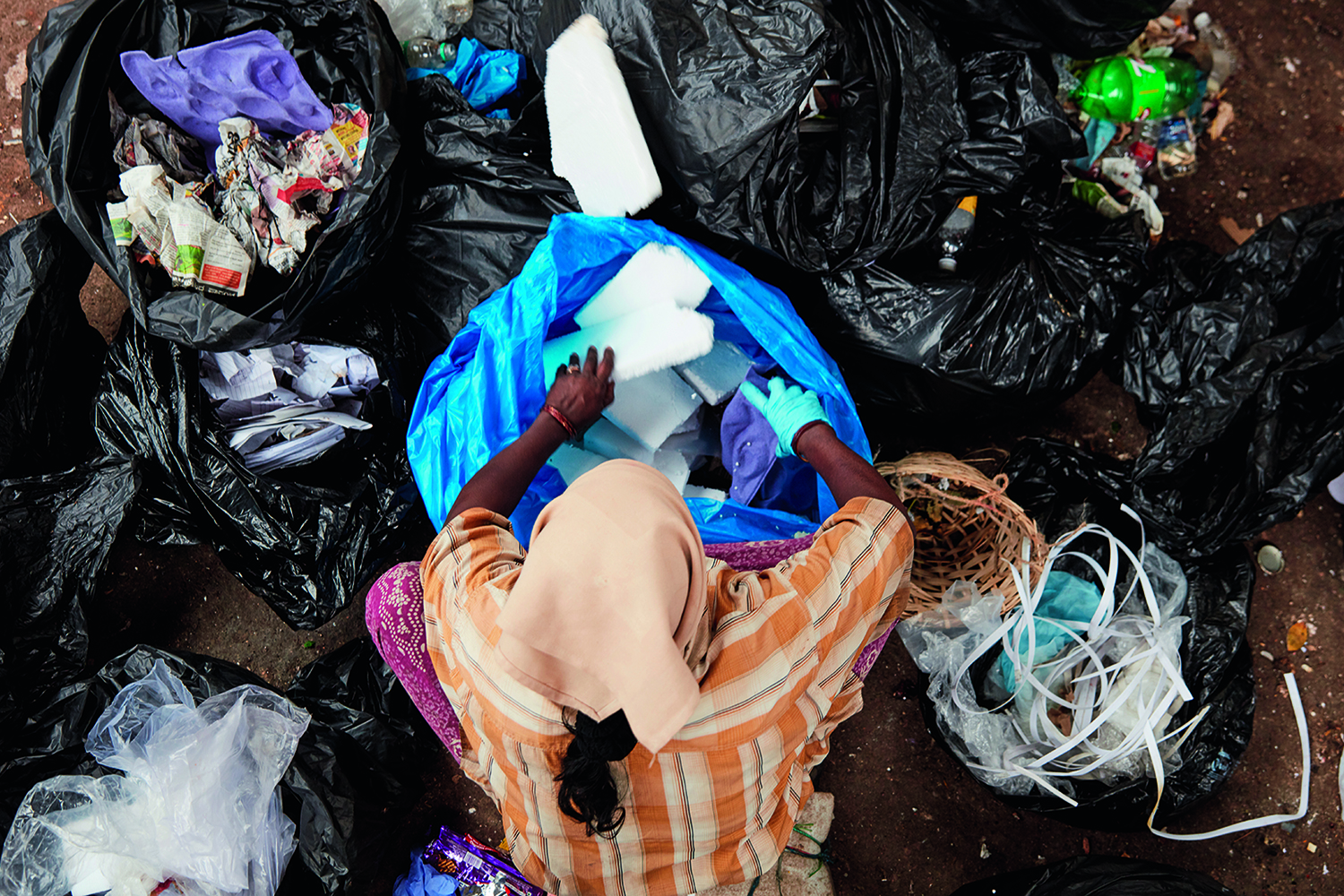
‘Once pickers are formalised, rights can be given. They can also open bank accounts and access healthcare services. It means the pickers no longer feel like thieves taking trash from the streets,’ says Shekar. ‘Pickers are drawn from the most vulnerable parts of society – many are victims of domestic violence, or parental alcoholism or death. Our aim is to give the next generation a choice to escape the cycle of waste picking.’
One such woman is Annamma, 40, who started working aged seven. ‘My parents were illiterate and my father was an alcoholic,’ she says. ‘My mother couldn’t earn enough waste picking alone to feed us, so I started picking with my siblings to help. As the daughter of a waste picker nobody would give me any other job, so this is all I’ve ever known.’ However, Annamma’s drive and determination to better her life and that of her children’s is typical of the waste pickers we meet. She was trained in managerial skills, thanks to help from Plastics For Change and Hasiru Dala, and now runs her own waste-recycling business. Today, two of her children are at university studying plastic engineering with a view to entering Bangalore’s thriving sustainable tech economy.
‘I’ve worked hard – ten hours a days, seven days a week for many years – and raised three children on picking waste, but the best thing is finding my own voice,’ she says. ‘I’m proud to call myself a feminist and an entrepreneur instead of being ashamed of what I do.’
Annamma’s pride is palpable. For the first time, women like Annamma have control over their destinies and they feel empowered to keep striving for more. ‘I don’t ever want to stop working. I love my work. Today I employ nine people, including my own husband,’ she smiles. ‘That’s a wonderful feeling.’
The Body Shop launches Community Trade recycled plastic in stores on 9 May
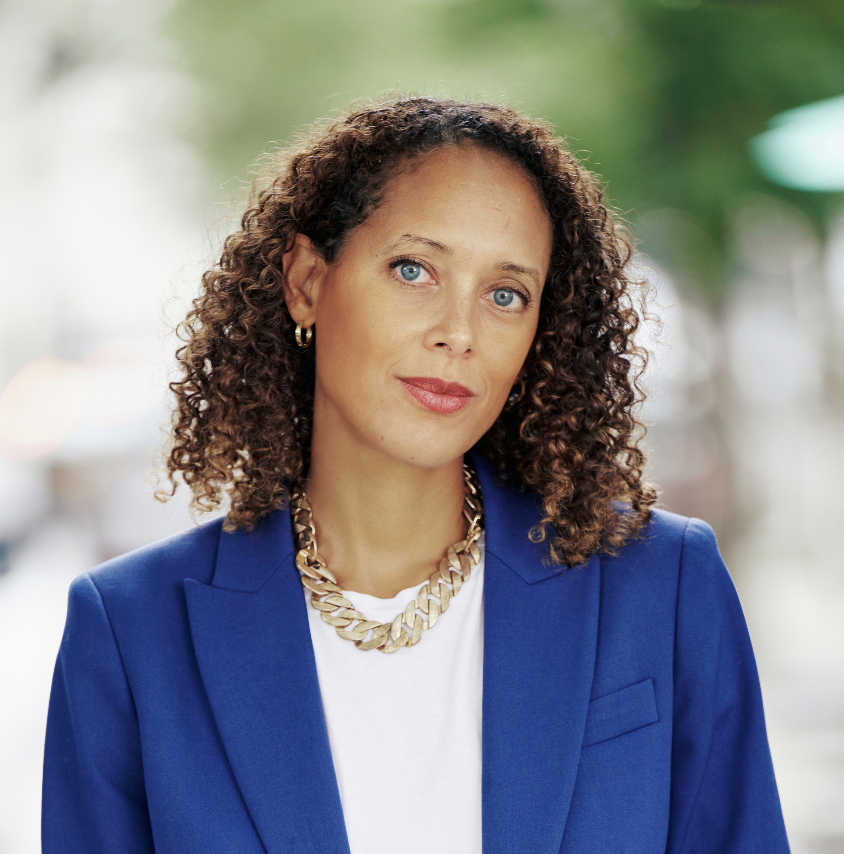
Andrea Thompson is Editor in Chief at Marie Claire UK and was named by We are the City as one of the UKs top 50 trailblazers for her work championing gender equality. She sits on the committee of the British Society of Magazine Editors where she acts as Chair.
Andrea has worked as a senior journalist for a range of publications over her 20 year career including The Sunday Times, The Guardian, The Daily Mail, Channel 4, Glamour and Grazia. At Marie Claire UK, Andrea oversees content, strategy, events and campaigns across fashion, beauty and the brand's purpose pillars. Follow her on instagram at @andreacanwrite